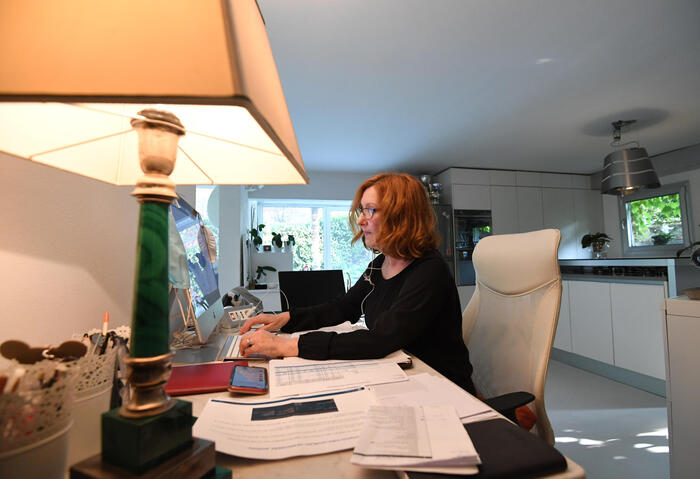Digital nomads must be fed separately.
That is the conclusion reached by Dave Cook, a British anthropologist and writer who has spent seven years documenting the evolution of this peculiar urban tribe, of which at some point he has felt part of.
Cook went to Bangkok in 2015 to attend one of the first international summits of the then new breed of nomads.
There she came into contact with a group of unprejudiced, restless and shrewd millennials, determined to put the world on their montera.
Mostly men, "dressed in bermuda shorts and nautical polo shirts", with the laptop always on their backs and far removed from the hippie aesthetic associated with backpackers, they looked more like puppies from Silicon Valley attending a corporate meeting in the
lobby
of a Florida hotel.
Listening to the presentations of the leaders of the fledgling movement, gurus like Fabian Dittrich or Marcus Meurer, Cook found it fascinating that they considered themselves the promoters of a kind of pragmatic revolution.
They did not aspire to bring down global capitalism, but to work for it from a comfortable distance.
They sought accommodation on the margins, in tropical paradises and unknown corners where it was still possible to live in a free, relaxed and “authentic” way without giving up becoming immensely rich by investing in cryptocurrencies or designing artificial intelligence neural networks.
His life project consisted of staying closely connected to the system in order to be able to disconnect from it.
Those of before and those of now
The pandemic, according to Cook's analysis, "democratized and trivialized the concept."
That first batch of genuine nomads, the technological and visionary, the one who felt heir to precursors like Steve Roberts (the man who toured the United States, already in the early eighties, designing avant-garde software from the seat of his computerized bicycle), began to to be confused, at least in the popular perception, with neo-rurals, supporters of the Great Renunciation and recent converts to the religion of telecommuting.
Sunset over Ponta do Sol, on the island of Madeira (Portugal). MATHEISL (Getty Images)
The coronavirus also offered an optimal landing platform for their plans for global domination: countries like Estonia, Portugal, Greece or Barbados began to actively promote, through a system of visas and tax exemptions, the establishment on their borders of digital nomads, that is to say, of young, enterprising, cosmopolitan talent and with a comparatively high purchasing power.
In theory, it was enough to guarantee them cheap rents and an optimal internet connection for this new outpost of the gentrifying army to establish itself in picturesque but degraded neighborhoods and rural environments forsaken by the hand of God, thus contributing to regenerate them, to introduce them to the virtuous circle of rampant modernity.
Thus, platforms such as Nomad List began to offer
rankings
updated in real time on the best destinations for digital nomads, and the not-so-incipient tribe became part of the daily landscape of the popular neighborhoods of Lisbon, Buenos Aires, Timisoara, Berlin, Cape Town, Istanbul, Manila, Perth, Warsaw, Nairobi or Belgrade.
The most intrepid took the logic of disconnection to the extreme to much less crowded places, such as the beaches of Bali, Croatia, Fuerteventura or the Algarve, the Nepalese plateau or the jungles of the Philippines, Cambodia, Thailand or the Mexican Caribbean.
Plumia, nomadic homeland
Another novelty, judging by what the academic Daniel Schlagwein explains in his complete essay
The History of Digital Nomadism
, is that the original tribe, far from giving up its ambition when it finds itself confused with tourists, backpackers, refugees from the pandemic and simple expatriates , has radicalized his project and today he aspires, more than ever, to change the world by traveling from end to end.
Proof of this is the Plumia project, an initiative oriented, according to Lauren Razavi, one of its main promoters, to create "a virtual homeland" for laptop nomads.
According to Razavi, "the nation states we inherited from the 19th century are outdated tools that we must get rid of as soon as possible."
They have fulfilled their function, that of providing a legal and identity umbrella to that half-globalized world of a century and a bit ago, and the time has come to “store them in the cloud or send them to the recycling bin of history”.
Shopping street in Chiang Mai, Thailand, another paradise for digital nomads for its spectacular scenery and low prices.simonlong (Getty Images)
The tribe that Razavi believes he represents, the herald of a reproductive logic, "does not need borders, passports or citizenship rights."
The British nationality that she herself possesses and that has allowed her to travel the world with hardly any restrictions seems to her "a lifetime subscription that implies many more duties than rights and that to this day, incomprehensibly, still cannot be cancelled."
Hence her proposal (not entirely frivolous, but not entirely serious either) to the United Nations that it recognize Plumia as "an online sovereign state" to whose nationality all digital nomads who request it may opt.
That is, all the members of the tribe who choose to renounce their nationalities of origin to embrace the utopia of living in a world of permeable and ductile borders.
Luxury expats in Madeira
The Portuguese journalist Susana Ferreira has masterfully documented in
Wired
what a colony of that state without a metropolis that Plumia intends to become could be like, in practice.
This is the case of the Portuguese parish of Ponta do Sol, on the southern coast of the island of Madeira.
Located between Canhas and Tabua, in the warmest region of the fragrant island, a short distance from tourist attractions such as Ribeira Brava or Câmara de Lobos and not far from the capital, Funchal, Ponta do Sol is by no means a remote wasteland cut off from the world or a demographic desert.
It has 8,125 inhabitants (around 5,000 of them in the parish itself and the rest in the surrounding districts), an agricultural, fishing and commercial economy, irrigation canals, waterfalls, paradisiacal beaches and a small but very active port.
However, the community of digital nomads that settled there during the pandemic, instigated by the Portuguese entrepreneur Gonçalo Hall, has lived here ever since with its back to the town, with minimal contact with the local population,
In September 2020, Hall, who grew up in the Lisbon neighborhood of Lapa, requested an interview with the president of the autonomous region of Madeira, Miguel Albuquerque, to propose that he do in Ponta do Sol something similar to what he himself had seen in the communities. nomads from Chiang Mai (Thailand) or Canggu (Indonesia).
According to what Hall himself told Ferreira, "a couple of beers were enough" for an agreement to be reached, to establish a pilot nucleus of "selective immigration" in the area, a community of expatriate entrepreneurs that would be managed by Hall himself. and by the local technology project incubator StartMadeira.
A woman works on her computer at Villingili beach in the Maldives.EyesWideOpen (Getty Images)
Nomadism on the shores (or behind) of the Atlantic
Continental Portugal had already given the green light to pilot projects of similar characteristics in Porto, Portimao or the Tagus estuary, so it was a matter of time before the tribe landed in some corner of the Lusitanian island arc.
Madeira, due to its proximity to the mainland, its attractiveness, its rich human texture and its infrastructures, was the obvious candidate.
When the new community of residents, named Digital Nomad Village, was launched in February 2021, it had just five residents: Gonçalo Hall and four others.
Today there are several hundred.
Mostly young or about to enter middle age.
Not immensely rich by the standards of their countries of origin (Germany, the United Kingdom, the United States...), but with the capacity to rent properties for between 1,000 and 2,000 euros per month on an island where the minimum interprofessional salary does not exceed 800 and in which more than 5,000 families are on waiting lists to access officially protected housing.
Those responsible for the project consider that Ponta do Sol offers "a space specifically designed for remote and freelance employees from all over the world to live and work in an ideal setting for their community and needs."
But Ferreiro collects multiple testimonies from residents of the Village who express a veiled dissatisfaction with the place where they have come in search of a different life.
They get bored, they live as if they had just landed on a foreign planet whose codes they don't understand, they have barely made progress in the Portuguese language, they try to consolidate a precarious social life by inviting each other to beach parties through private messaging channels like Slack.
Aerial view of Ponta do Sol, in Madeira, where a group of digital nomads have settled. Roberto Moiola (Getty Images)
A neighbor has dubbed them "genital nomads", because their presence in this corner of the island has apparently triggered activity on Tinder.
The most recurring query in local forums is what time the buses to Funchal run.
Even Melissa Cabral, one of the few local residents who works for the expat community (she met some of them in a local coffee shop, entered the conversation out of curiosity and to practice her English, and months later was offered to take over. part time
community manager
tasks
del Village) recognizes that expatriates live with their backs to Ponta do Sol because “their lifestyle is very different from ours”.
They do not feel "really at home", and therefore tend to take refuge in a separate compartment disconnected from the town.
Most likely, many of them will end up leaving the island in the medium term, something, deep down, entirely consistent with the philosophy of digital nomadism, which consists of accumulating experiences and not putting down roots.
do you the favor of staying
Despite all the regrets, the inhabitants of the parish do not want them to leave.
In an environment from which young people flee as soon as they are old enough to seek better professional prospects in mainland Portugal or abroad, establishing a new community of residents is a promise for the future that is hard to give up.
However, many criticize the new tenants in Ponta do Sol for their lack of willingness (or ability) to adapt and how much they are contributing, despite themselves, to making the price of housing less and less affordable. for the locals.
StartUp Madeira sources highlight that itinerant teleworkers contribute around 1.7 million euros per month to the economy of the autonomous region.
Ferreira argues that this is a ridiculous fraction of what immigrants simply pay to social security, and that many of these, "born in Brazil, Cape Verde, Angola, Nepal, Bangladesh or Venezuela", are not tending to no red carpet, no tailor-made communities are created for them, no tax exemptions or preferential visas are offered to them.
Seven years have passed since David Cook identified in Bangkok the emerging tribe of young nomads who were going to take the world by storm.
But digital nomadism, more than a generationally new way of inhabiting the planet and ending its sclerotic borders, continues to be a private club, a minority and diffuse elite that travels the planet asking, perhaps without even realizing it, to be feed separately.
You can follow ICON on
,
,
, or subscribe here to the
Newsletter
.













/cloudfront-eu-central-1.images.arcpublishing.com/prisa/EXJQILQR5QI7OMVRTERD7AEZAU.jpg)
